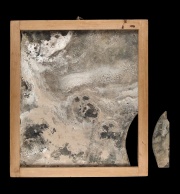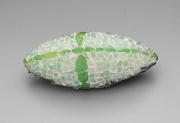Difference between revisions of "Window glass"
m (Text replace - "\[http:\/\/cameo\.mfa\.org\/materials\/fullrecord\.asp\?name=([^\s]+)\s(.*)\]" to "$2") |
|||
| (9 intermediate revisions by the same user not shown) | |||
| Line 1: | Line 1: | ||
| − | [[File:01.8231-SC62918.jpg|thumb| | + | [[File:01.8231-SC62918.jpg|thumb|Roman window glass<br>MFA Acc. #: 01.8231]] |
== Description == | == Description == | ||
| − | A transparent, flat, glass sheet used for glazing windows. Window glass has been made by several techniques. These include [[crown%20glass|crown glass]] (17th century), [[cylinder%20glass|cylinder glass]] (mass produced in the 1830s), [[float%20glass|float glass]] ( | + | A transparent, flat, glass sheet used for glazing windows. Window glass has been made by several techniques. These include [[crown%20glass|crown glass]] (17th century), [[cylinder%20glass|cylinder glass]] (mass produced in the 1830s), [[float%20glass|float glass]] (developed between 1953 and 1957) and [[insulated%20glass|insulated glass]]. Currently most window glass is made by the float process in which a continuous ribbon of glass is flowed onto a molten tin bath. The top surface of the glass is subjected to nitrogen under pressure to obtain a polished finish. After forming, the glass is usually annealed for the removal of stresses and to increase the glass's hardness and durability. In general, window glass has a higher magnesium oxide and sodium oxide content than container glass, and a lower silica, calcium oxide, and aluminum oxide content.[Surface treatments, coatings or lamination may be applied to improve the chemical durability. |
| + | * Laminated glass consists of sheets bonded together using a plastic interlayer. The glass and interlayers can be supplied in a variety of colors and thicknesses. By laminating the glass, other beneficial properties can be added to the base glass such as color, sound control, strength, and safety. | ||
| + | * Coatings can be applied to the surface of float glass to modify its appearance and improve its properties, such as altering the reflective and transmissive properties to provide energy efficiency or minimize UV light. | ||
| + | |||
| + | Many plastic alternatives to window have also been developed. For a comparison of the properties of transparent plastic boards, please see [[Glazing comparison (Clear plastic sheets)|glazing comparison]]. | ||
== Synonyms and Related Terms == | == Synonyms and Related Terms == | ||
| − | vitre (Fr.); vidraça (Port.) | + | flat glass; plate glass; sheet glass; vitre (Fr.); vidraça (Port.) |
| − | [[File:2006.148-SC177522.jpg|thumb| | + | [[File:2006.148-SC177522.jpg|thumb|Cross brooch<br>MFA Acc. #: 2006.148]] |
| − | + | == Physical and Chemical Properties == | |
| − | |||
| − | |||
| − | |||
| − | |||
| − | == | + | * Refractive Index = 1.45 - 1.65 |
| + | * Density = 2.2-3.8 g/ml | ||
| + | |||
| + | ==Resources and Citations== | ||
* G.S.Brady, ''Materials Handbook'', McGraw-Hill Book Co., New York, 1971 Comment: p. 363 | * G.S.Brady, ''Materials Handbook'', McGraw-Hill Book Co., New York, 1971 Comment: p. 363 | ||
| − | |||
* ''Dictionary of Building Preservation'', Ward Bucher, ed., John Wiley & Sons, Inc., New York City, 1996 | * ''Dictionary of Building Preservation'', Ward Bucher, ed., John Wiley & Sons, Inc., New York City, 1996 | ||
| − | |||
* Thomas C. Jester (ed.), ''Twentieth-Century Building Materials'', McGraw-Hill Companies, Washington DC, 1995 | * Thomas C. Jester (ed.), ''Twentieth-Century Building Materials'', McGraw-Hill Companies, Washington DC, 1995 | ||
| − | + | * Wikipedia: [https://en.wikipedia.org/wiki/Glass Glass ](Accessed Nov. 29, 2005 and Aug. 2023) | |
| − | * Wikipedia | ||
| − | [[Category:Materials database]] | + | [[Category:Materials database]][[Category: MWG]][[Category:Glazing]] |
Latest revision as of 13:10, 23 October 2023
Description
A transparent, flat, glass sheet used for glazing windows. Window glass has been made by several techniques. These include Crown glass (17th century), Cylinder glass (mass produced in the 1830s), Float glass (developed between 1953 and 1957) and Insulated glass. Currently most window glass is made by the float process in which a continuous ribbon of glass is flowed onto a molten tin bath. The top surface of the glass is subjected to nitrogen under pressure to obtain a polished finish. After forming, the glass is usually annealed for the removal of stresses and to increase the glass's hardness and durability. In general, window glass has a higher magnesium oxide and sodium oxide content than container glass, and a lower silica, calcium oxide, and aluminum oxide content.[Surface treatments, coatings or lamination may be applied to improve the chemical durability.
- Laminated glass consists of sheets bonded together using a plastic interlayer. The glass and interlayers can be supplied in a variety of colors and thicknesses. By laminating the glass, other beneficial properties can be added to the base glass such as color, sound control, strength, and safety.
- Coatings can be applied to the surface of float glass to modify its appearance and improve its properties, such as altering the reflective and transmissive properties to provide energy efficiency or minimize UV light.
Many plastic alternatives to window have also been developed. For a comparison of the properties of transparent plastic boards, please see glazing comparison.
Synonyms and Related Terms
flat glass; plate glass; sheet glass; vitre (Fr.); vidraça (Port.)
Physical and Chemical Properties
- Refractive Index = 1.45 - 1.65
- Density = 2.2-3.8 g/ml
Resources and Citations
- G.S.Brady, Materials Handbook, McGraw-Hill Book Co., New York, 1971 Comment: p. 363
- Dictionary of Building Preservation, Ward Bucher, ed., John Wiley & Sons, Inc., New York City, 1996
- Thomas C. Jester (ed.), Twentieth-Century Building Materials, McGraw-Hill Companies, Washington DC, 1995
- Wikipedia: Glass (Accessed Nov. 29, 2005 and Aug. 2023)

